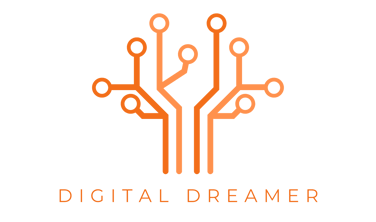Digital Marketing 101: Essential Strategies for New Businesses
Digital Dreamer


In today’s hyper-connected world, digital marketing is no longer optional—it’s a necessity for business success. For new businesses, understanding and implementing effective digital marketing strategies is about more than just staying competitive; it’s about creating a solid foundation for long-term growth in an increasingly digital marketplace.
Although the digital marketing landscape may seem overwhelming at first, breaking it down into manageable components makes it easier to navigate. Let’s explore the essential strategies that can help new businesses thrive in the digital age.
Understanding the Digital Marketing Landscape
Digital marketing is a broad ecosystem encompassing multiple channels and strategies, each with its unique role in driving business growth. However, success doesn’t require mastering every channel overnight. Instead, it calls for a strategic approach that aligns with your business goals, resources, and target audience.
By focusing on the core components of digital marketing, you can build a strong foundation that supports your business’s growth and adaptability.
Website Development and Optimization
Your website is more than just an online presence—it’s the digital headquarters of your business, where all your marketing efforts converge. But in today’s competitive environment, simply having a website isn’t enough. Your website must function as a powerful marketing tool that converts visitors into loyal customers.
To achieve this, prioritize user experience (UX) by ensuring fast loading speeds, mobile responsiveness, and intuitive navigation. These elements create a seamless experience that keeps visitors engaged. Additionally, search engine optimization (SEO) should be integrated into your website’s design to make it easy for potential customers to find you through organic search.
Don’t forget to implement analytics tools from the start. Tracking user behavior and website performance will provide valuable insights for making data-driven improvements over time.
Content Marketing: Adding Value to Your Audience
Content marketing is the backbone of your digital presence. It drives organic traffic, builds trust, and positions your business as an authority in your industry. However, effective content marketing goes beyond occasional blog posts—it’s about creating resources that address your audience’s specific needs and challenges.
Focus on producing well-researched, high-quality content that provides real value. This could include how-to guides, case studies, industry insights, or trend analyses. Consistency is key—maintain a regular publishing schedule and ensure your content aligns with your broader business objectives.
By delivering valuable content, you can attract and retain your target audience while building a strong digital footprint.
Social Media Marketing: Building Connections
Social media platforms offer unparalleled opportunities to connect with your audience. However, success on social media requires more than just frequent posting.
Start by identifying the platforms where your target audience is most active. For example, LinkedIn may be ideal for B2B businesses, while Instagram and TikTok cater to younger, visually-driven audiences. Instead of trying to maintain a presence on every platform, focus your efforts on the channels that offer the most impact.
Your social media strategy should prioritize meaningful interactions. Create content that encourages engagement, respond to comments and messages promptly, and participate in relevant industry conversations. Building genuine connections fosters trust and loyalty among your audience.
Search Engine Optimization: Boosting Visibility
SEO remains a cornerstone of digital marketing, offering long-term benefits that complement paid advertising efforts. While paid ads can drive immediate traffic, SEO provides sustainable, cost-effective visibility over time.
To succeed in SEO, focus on creating high-quality, relevant content that naturally incorporates important keywords. Address user intent by answering the questions your audience is searching for. Additionally, technical SEO elements—such as site speed, mobile optimization, and proper indexing—lay the groundwork for strong search engine performance.
Email Marketing: Nurturing Relationships
Email marketing continues to be one of the most effective channels for engaging your audience and driving conversions. The key to success lies in building a quality subscriber list and delivering consistent value through your communications.
Segment your email list to tailor content to specific audience groups, ensuring relevance and personalization. Craft engaging subject lines and provide meaningful content that addresses your subscribers’ needs. Whether it’s exclusive offers, educational resources, or updates about your business, your emails should strengthen relationships and encourage loyalty.
Paid Advertising: Accelerating Results
While organic strategies form the foundation of digital marketing, paid advertising can help you achieve faster results. Platforms like Google Ads and social media advertising offer advanced targeting options, allowing you to reach specific audience segments with precision.
Start small by testing different ad formats, messages, and audience groups. Use data to identify what works and scale your campaigns accordingly. Tracking metrics like customer acquisition costs (CAC) and return on ad spend (ROAS) ensures your advertising efforts remain efficient and effective.
Measuring and Optimizing Performance
Data is the backbone of digital marketing success. By implementing tracking systems from the beginning, you can monitor key performance indicators (KPIs) across all channels.
Analyze metrics such as website traffic, conversion rates, engagement levels, and email open rates to understand what’s working and where improvements are needed. Regularly reviewing your performance data allows you to refine your strategies and allocate resources effectively.
Looking Ahead: Adapting to Change
The digital marketing landscape is constantly evolving, shaped by new technologies and shifting consumer behaviors. Staying informed about industry trends and emerging tools is essential for maintaining a competitive edge.
For new businesses, the path to success lies in mastering the fundamentals first—developing a strong website, creating valuable content, and building meaningful connections through social media and email. As your business grows, you can expand your efforts based on performance data and new opportunities.
Remember, sustainable success in digital marketing is about consistently delivering value to your audience while maintaining a cohesive brand message across all channels. By staying flexible and adaptable, your business can thrive in the ever-changing digital world.
Digital Dreamer
Published 03/31/2025
Stay Ahead
Explore technology and solutions for digital success. Make your online journey a successful one.
© 2025. All rights reserved.
